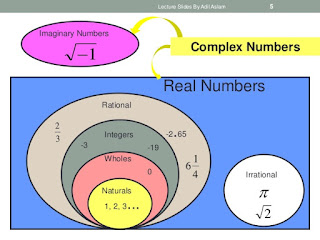Types of Numbers
(Source: http://web.mst.edu/~kosbar/test/ff/elem/typesofnumbers.html)
There are many different types of numbers
(Image from https://www.slideshare.net/AdilAslam4/numbers-and-its-types-in-mathematics)
1. NATURAL or COUNTING NUMBERS = are the set of numbers that
you learn as a child to use to count how many objects you see. These numbers
are 1, 2, 3, 4, 5, 6, and soon. Sometimes they are also referred to as POSITIVE
INTEGERS.
2. WHOLE NUMBERS = these numbers are ALL the Natural or
Counting Numbers PLUS ZERO (o). In essence, they are 0, 1, 2, 3, 4, 5, 6, and
soon. They are also called NON-NEGATIVE INTEGERS.
3. INTEGERS = these are ALL whole numbers INCLUDING their
NEGATIVE counterparts. These are 0, 1, 2, 3, 4, 5, and soon AND -1, -2, -3, -4,
-5 and soon.
4. RATIONAL NUMBERS = any number that can be expressed as a
RATIO of INTEGERS, or as a FRACTION. Rational numbers include ALL INTEGERS and
their FRACTIONS such as 0, 2, 4, 2/3, - 3 . -8, -4/5, -45/37, etc.
All rational numbers have a DECIMAL equivalent. For example,
a) 1/5 = 0.200....
b) 5/7 = 2/3 = 0.66666 ...
c) 1/7 = 0.142857142857142857...
The decimal equivalent of rational numbers always end in a
repeating digit, or a series of digits. Reference the above examples, we can
see that the repeating digit of 1/5 is 0; the repeating digits of 2/3 is 6; and
1/7 ends with the sequence 14285 repeating forever.
5. IRRATIONAL NUMBERS =
are numbers that have a decimal equivalent; however they don't have a
repeating digit or series of digits. This also means that one cannot find a
ratio of integers that is exactly equal to the number. Common examples of
irrational numbers are the square root of 2 and π (pi).
6. REAL NUMBERS = include ALL the RATIONALS and ALL the
IRRATIONALS. All the different types of numbers from 1 to 5 are REAL NUMBERS.
7. IMAGINARY NUMBERS = any real number multiplied by the
square root of -1. Often the square root of -1 is referred to as i or j. So an
imaginary number can be written as 3.2i or -8.77j. It is OK to use irrational
multiplying numbers, so πj is a perfectly reasonable imaginary number.
8. COMPLEX NUMBERS = any real number ADDED to any IMAGINARY
number, such as 4 + 6i, 2/3 + 25j, etc.

